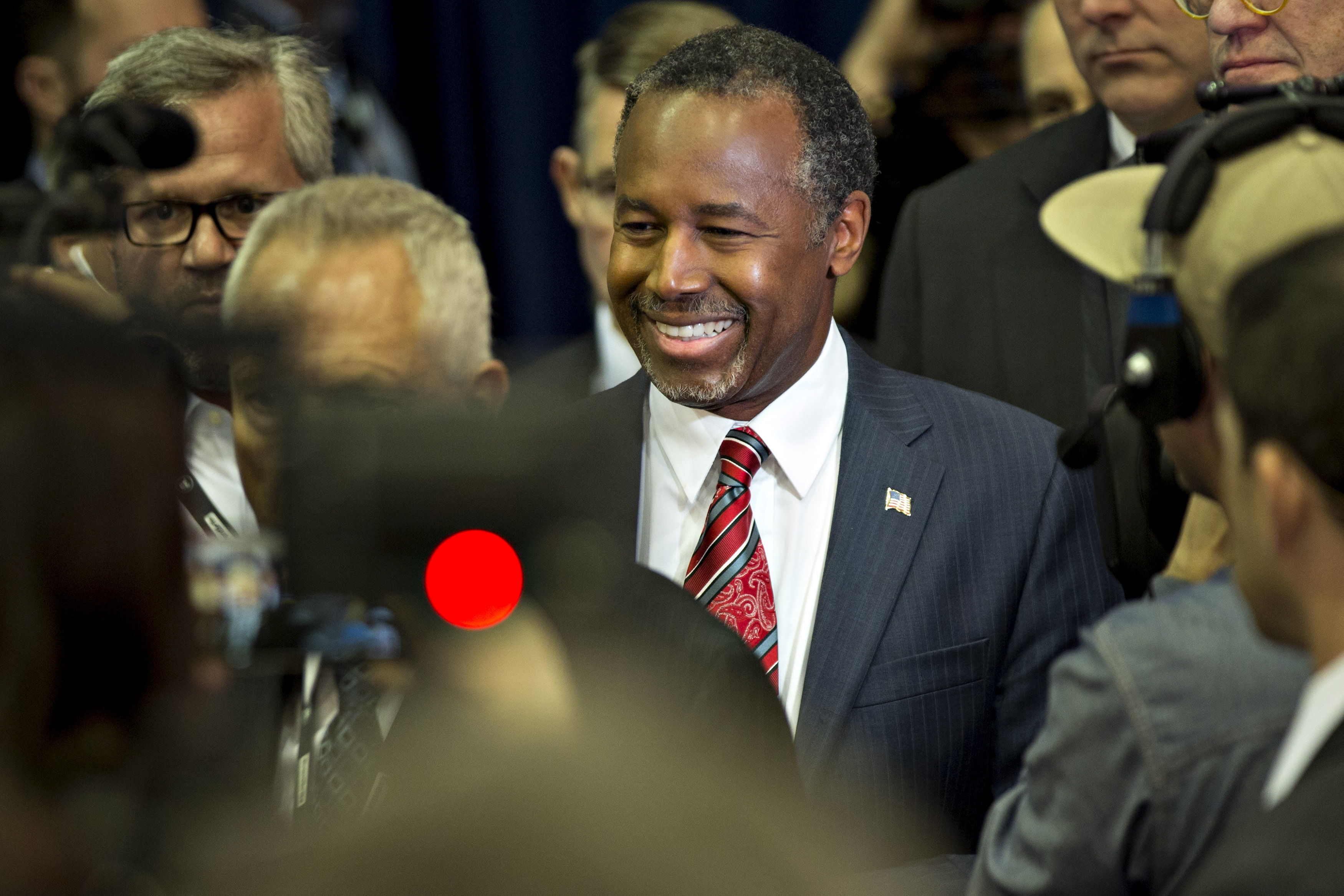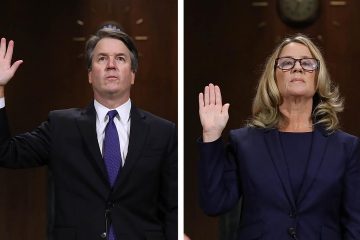Trump Camp Optimistic Minority Outreach Efforts Will Be Effective

(Bloomberg) —Nearly three weeks ago, Donald Trump began a blunt appeal to Hispanics and blacks.
With his “what the hell do you have to lose?” line, his talk of softening his stance on immigrants residing in the country illegally, his trip to Mexico City to express respect for the Mexican people, and his ventures into African-American communities in two U.S. cities, the Republican presidential nominee and his campaign strategists have been working to target minority voters.
Are those efforts paying off?
“In a word, no,” said Hughey Newsome, a black conservative leader and Washington-based business consultant. “I don’t see any changes at all. Based on my circles, African-Americans understand that the Democrats take the vote for granted, but that doesn’t mean they trust the GOP, though.”
According to a national CNN survey released Tuesday, Trump has made some headway among non-white registered voters but most still see him negatively. Democratic nominee Hillary Clinton had 70 percent support to Trump’s 17 percent in a four-way race with the Libertarian and Green Party candidates—a 2-point decrease for Clinton and a 10-point increase for Trump since July. Trump is seen favorably by 18 percent and unfavorably by 80 percent; Clinton has a 65 percent favorability rating and 32 percent see her unfavorably.
Some private polling by a pro-Trump super-PAC hasn’t detected a dent with Hispanics in Ohio and Florida, except among small-business owners, where he is over 30 percent, according to a person familiar with the polling.
Trump’s campaign aides still say they’re optimistic. Democrats have taken the minority vote for granted and now they’re feeling the heat, said Jason Miller, Trump’s senior communications strategist.
“People are saying, here’s a guy who’s asking for our vote. He’s telling us he cares about us. Why doesn’t Hillary Clinton do that?” Miller said. “The guy is a very, very effective communicator. It’s resonating and it’s resonating in a big way.”
Trump received praise for visiting a downcast neighborhood in Philadelphia to meet with local African-American business and civic leaders, and for venturing to Detroit for his first campaign stop at a predominantly black church over the Labor Day weekend.
This week, the Trump campaign is doubling down on recruitment of minorities, and making a fresh pitch to women, aides said.
Three female surrogates are taking on bigger roles within the campaign—Omarosa Manigault, who met Trump when she was a contestant on his Apprentice reality-TV show, will step up outreach to African-American media outlets. A.J. Delgado, a lawyer and conservative commentator with Cuban roots, will push for coverage in Spanish media outlets. And Sarah Huckabee Sanders will work on communications targeted at faith leaders, gun rights supporters, military groups, and other voter coalitions, according to people familiar with the staff changes.
Trump, in an interview with reporters on Monday aboard his plane in between campaign stops in Ohio, said, “I think I’m going to do great with African-Americans. I say it very simply: the crime is through the roof. Through the roof. People can’t walk down the street without getting shot. I’ll stop that. There are no jobs. I’m going to bring back jobs.”
The Clinton campaign has been reminding voters about Trump’s skepticism that President Barack Obama was born in the U.S., and reporters on Monday pressed him about the so-called “birther” allegations regarding the nation’s first black president.
“I don’t talk about it because the problem is if I talk about that it dominates the economy,” he said. “The thing that I’m really going to be best at is jobs and renegotiating trade deals.”
Expanding their coalition of minority voters has been a major goal for the Trump campaign, and every day they’re not adding votes is a big loss, according to GOP strategists who say Trump needs to boost his support among black voters to have a chance at defeating Clinton.
“Trump understands that black voter outreach is not a microwave process,” said Republican operative John Burnett, who is black. “It will take multiple visits to various communities of color by him and surrogates to talk about economic development, education, entrepreneurship, jobs, and criminal justice reform.”
Some African-American voters may wait to hear what Trump has to say in the first debate with Clinton before making a final decision, said Burnett, who advises the New York GOP.
“He must stay consistent and not go off the rails,” Burnett added. “There is no room for error.”
Last week, there were some rough patches.
After Trump delivered a hardline speech on immigration Wednesday night, despite assurances to National Hispanic Advisory Council he’d act with compassion, at least one of the advisers resigned.
A top Trump adviser on minority outreach, Pastor Mark Burns, sparked criticism from within the black community by tweeting a cartoon of Clinton in blackface. Burns apologized, but in Detroit, the pastor of Greater Faith Ministries, the black mega-church Trump visited Saturday, decided not to let Burns speak.
Inside the church, Trump danced to hymns. Outside, police had to use horses to break up protesters who attempted to rush the entrance of the church.
Former GOP presidential contender Ben Carson, who has emerged as the most influential African-American advising Trump, praised Trump following the visit. “It was excellent. The reception was good,” Carson said.
The current occupant of Carson’s boyhood home, Felicia Reese, made clear after Trump’s visit there that while she would respectfully meet with Trump, she was still a Democrat. “We were polite. We were cordial. He’s a guest of the city of Detroit,” Reese told the Detroit Free Press. “Dr. Carson is a native son of our neighborhood and of this house, and he’s always welcome.”
Trump aides on Monday pointed to a New York Times article that described apathy in the black community toward Clinton. In interviews with Bloomberg Politics over the last two weeks, young minority voters expressed a disinterest in both Clinton and Trump. Among a handful of blacks and Latinos who went to Trump’s rally in Austin, Texas, two weeks ago, several of them said in re-interviews Monday that neither Trump nor Clinton has won them over yet.
“I don’t know where I’ll be, but Trump is a definite no,” said Amber Watts, a 34-year-old childcare provider from Austin. “Everyone who looks like me, he’s putting down. He’s ready to shut us out of the country and send us back where they came from.”
Arnold Martinez, a 27-year-old catering cook, said he thinks Trump sells hate and exclusion and that his new rhetoric of late is little more than “pandering.” But Clinton dulls his hopes for the future, too.
“The one thing I can kind of agree on is that the establishment, the old political system needs to be done away with and Hillary’s been around for a long time,” Martinez said. He said he thinks Clinton will campaign hard for minority voters, then do whatever the establishment wants to do once elected.
Kaylin Pratt, a 22-year-old college student from Houston, saw the news coverage of Trump’s visit to the black church in Detroit on Saturday. “Yeah, no. I haven’t changed my mind about him,” Pratt said.
Three days earlier, during Trump’s visit to Philadelphia, he met with Shalga Hightower, 55, whose daughter Iofemi was murdered by gang members.
When asked by a member of the media what Trump thought of the two dozen demonstrators who had gathered to protest his meeting with local African-American business and civic leaders, the candidate was briefly interrupted by Jamar Hightower, 26, the brother of the murdered woman.
“It’s bigger than that,” Jamar Hightower said. “I mean, they’ve got their own police and I mean, they got their own beliefs and it’s freedom of speech and they can think what they want. But at the end of the day, I feel that this man is the only one that’s actually standing up to do something about it.”
He was echoing his mother, who hesitated at first when asked if she was supporting Trump for president, and after a prolonged pause answered simply, “Yes.”







No Comment